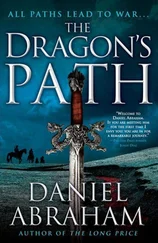Daniel Abraham - THE
Здесь есть возможность читать онлайн «Daniel Abraham - THE» весь текст электронной книги совершенно бесплатно (целиком полную версию без сокращений). В некоторых случаях можно слушать аудио, скачать через торрент в формате fb2 и присутствует краткое содержание. Жанр: Фэнтези, на английском языке. Описание произведения, (предисловие) а так же отзывы посетителей доступны на портале библиотеки ЛибКат.
- Название:THE
- Автор:
- Жанр:
- Год:неизвестен
- ISBN:нет данных
- Рейтинг книги:3 / 5. Голосов: 1
-
Избранное:Добавить в избранное
- Отзывы:
-
Ваша оценка:
- 60
- 1
- 2
- 3
- 4
- 5
THE: краткое содержание, описание и аннотация
Предлагаем к чтению аннотацию, описание, краткое содержание или предисловие (зависит от того, что написал сам автор книги «THE»). Если вы не нашли необходимую информацию о книге — напишите в комментариях, мы постараемся отыскать её.
THE — читать онлайн бесплатно полную книгу (весь текст) целиком
Ниже представлен текст книги, разбитый по страницам. Система сохранения места последней прочитанной страницы, позволяет с удобством читать онлайн бесплатно книгу «THE», без необходимости каждый раз заново искать на чём Вы остановились. Поставьте закладку, и сможете в любой момент перейти на страницу, на которой закончили чтение.
Интервал:
Закладка:
small, rough shack.
He was sitting beside the fire, frowning into the flames and eating a
mush of rice and raisins from a small wooden bowl. The years hadn't been
kind to him. He was thicker than he'd been when she knew him, an
unhealthy fatness that had little to do with indulgence. His color was
poor; what remained of his hair was white stained yellow by neglect. He
looked angry. He looked lonesome.
"Uncle Maati," she said.
He startled. His eyes flashed. Eiah couldn't tell if it was anger or
fear. But whatever it was had a trace of pleasure to it.
"Don't know who you mean," he said. "Name's Daavit."
Eiah chuckled and stepped into the small room. It smelled of bodies and
smoke and the raisins in Maati's food. Eiah found a small chair and
pulled it to the fire beside the old poet, her chosen uncle, the man who
had destroyed the world. They sat silently for a while.
"It was the way they died," Eiah said. "All the stories you told me when
I was young about the prices that the andat exacted when a poet's
binding failed. The one whose blood turned dry. The one whose belly
swelled up like he was pregnant, and when they cut him open it was all
ice and seaweed. All of them. I started to hear stories. What was that,
four years ago?"
At first she thought he wouldn't answer. He cupped two thick fingers
into the rice and ate what they lifted out. He swallowed. He sucked his
teeth.
"Six," he said.
"Six years," she said. "Women started appearing here and there, dead in
strange ways."
He didn't answer. Eiah waited for the space of five slow breaths
together before she went on.
"You told me stories about the andat when I was young," she said. "I
remember most of it, I think. I know that a binding only works once. In
order to bind the same andat again, the poet has to invent a whole new
way to describe the thought. You used to tell me about how the poets of
the Old Empire would bind three or four andat in a lifetime. I thought
at the time you envied them, but I saw later that you were only sick at
the waste of it."
Maati sighed and looked down.
"And I remember when you tried to explain to me why only men could be
poets," she said. "As I recall, the arguments weren't all that
convincing to me."
"You were a stubborn girl," Maati said.
"You've changed your mind," Eiah said. "You've lost all your books. All
the grammars and histories and records of the andat that have come
before. They're gone. All the poets gone but you and perhaps Cehmai. And
in the history of the Empire, the Second Empire, the Khaiem, the one
thing you know is that a woman has never been a poet. So perhaps, if
women think differently enough from men, the bindings they create will
succeed, even with nothing but your own memory to draw from."
"Who told you? Otah?"
"I know my father had letters from you," Eiah said. "I don't know what
was in them. He didn't tell me."
"A women's grammar," Maati said. "We're building a women's gram„ mar.
Eiah took the bowl from his hands and put it on the floor with a
clatter. Outside, a gust of wind shrilled past the shack. Smoke bellied
out from the fire, rising into the air, thinning as it went. When he
looked at her, the pleasure was gone from his eyes.
"It's the best hope," Maati said. "It's the only way to ... undo what's
been done."
"You can't do this, Maati-kya," Eiah said, her voice gentle.
Maati started to his feet. The stool he'd sat on clattered to the floor.
Eiah pulled back from his accusing finger.
"Don't you tell that to me, Eiah," Maati said, biting at the words. "I
know he doesn't approve. I asked his help. Eight years ago, I risked my
life by sending to him, asking the Emperor of this pisspot empire for
help. And what did he say? No. Let the world be the world, he said. He
doesn't see what it is out here. He doesn't see the pain and the ache
and the suffering. So don't you tell we what to do. Every girl I've
lost, it's his fault. Every time we try and fall short, it's because
we're sneaking around in warehouses and low towns. Meeting in secret
like criminals-"
"Maati-kya-"
"I can do this," the old poet continued, a fleck of white foam at the
corner of his mouth. "I have to. I have to retrieve my error. I have to
fix what I broke. I know I'm hated. I know what the world's become
because of me. But these girls are dedicated and smart and willing to
die if that's what's called for. Willing to die. How can you and your
great and glorious father tell me that I'm wrong to try?"
"I didn't say you shouldn't try," Eiah said. "I said you can't do it.
Not alone."
Maati's mouth worked for a moment. His fingertip traced an arc down to
the fire grate as the anger left him. Confusion washed through his
expression, his shoulders sagging and his chest sinking in. He reminded
Eiah of a puppet with its strings fouled. She rose and took his hand as
she had the dead woman's.
"I haven't come here on my father's business," Eiah said. "I've come to
help."
"Oh," Maati said. A tentative smile found its way to his lips. "Well. I
... that is ..."
He frowned viciously and wiped at his eyes with one hand. Eiah stepped
forward and put her arms around him. His clothes smelled rank and
unwashed; his flesh was soft, his skin papery. When he returned her
embrace, she would not have traded the moment for anything.
1
It was the fifth month of the Emperor's self-imposed exile. The day had
been filled, as always, with meetings and conversations and
appreciations of artistic tableaux. Otah had retired early, claiming a
headache rather than face another banquet of heavy, overspiced Galtic food.
The night birds in the garden below his window sang unfamiliar songs.
The perfume of the wide, pale flowers was equal parts sweetness and
pepper. The rooms of his suite were hung with heavy Galtic tapestries,
knotwork soldiers slaughtering one another in memory of some battle of
which Otah had never heard.
It was, coincidentally, the sixty-third anniversary of his birth. He
hadn't chosen to make it known; the High Council might have staged some
further celebration, and he had had a bellyful of celebrations. In that
day, he had been called upon to admire a gold- and jewel-encrusted
clockwork whose religious significance was obscure to him; he had moved
in slow procession down the narrow streets and through the grand halls
with their awkward, blocky architecture and their strange, smoky
incense; he had spoken to two members of the High Council to no
observable effect. At this moment, he could be sitting with them again,
making the same points, suffering the same deflections. Instead, he
watched the thin clouds pass across the crescent moon.
He had become accustomed to feeling alone. It was true that with a word
or a gesture he could summon his counselors or singing slaves, scholars
or priests. Another night, he might have, if only in hope that this time
it would be different; that the company would do something more than
remind him how little comfort it provided. Instead, he went to the
ornate writing desk and took what solace he could.
Kiyan-kya-
I have done what I said I would do. I have come to our old
enemies, I have pled my case and pled and pled and pled, and
now I suppose I'll plead some more. The full council is set
to make their vote in a week's time. I know I shouldgo out
Читать дальшеИнтервал:
Закладка:
Похожие книги на «THE»
Представляем Вашему вниманию похожие книги на «THE» списком для выбора. Мы отобрали схожую по названию и смыслу литературу в надежде предоставить читателям больше вариантов отыскать новые, интересные, ещё непрочитанные произведения.
Обсуждение, отзывы о книге «THE» и просто собственные мнения читателей. Оставьте ваши комментарии, напишите, что Вы думаете о произведении, его смысле или главных героях. Укажите что конкретно понравилось, а что нет, и почему Вы так считаете.










